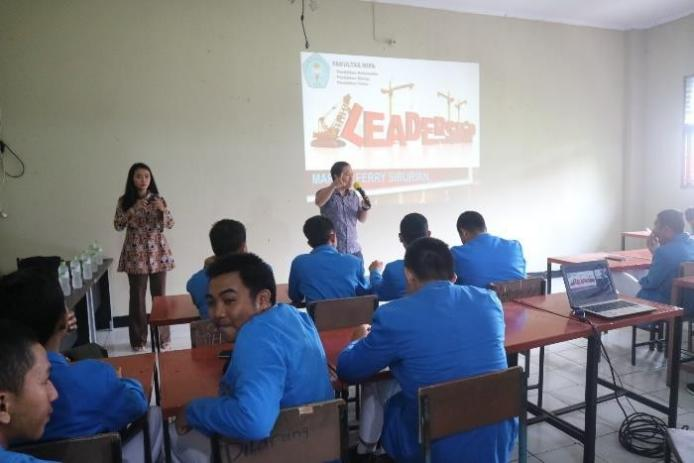
Membangun Generasi Pemimpin yang Literat untuk Masa Depan dengan Menerapkan Pendekatan Ekologi di SMK Mahadika 2
Yulian Dinihari(1*), Mashudi Alamsyah(2), Martua Ferry Siburian(3), Giry Marhento(4), Rifqi Pratama(5), Musringudin Musringudin(6),
(1) Universitas Indraprasta PGRI
(2) Universitas Indraprasta PGRI
(3) Universitas Indraprasta PGRI
(4) Universitas Indraprasta PGRI
(5) Universitas Indraprasta PGRI
(6) Universitas Prof Dr Hamka
(*) Corresponding Author
Abstract
Program pengabdian kepada masyarakat ini bertujuan untuk meningkatkan kemampuan kepemimpinan siswa di SMK Mahadika 2 melalui pendekatan ekologi yang terintegrasi dengan literasi. Dengan pendekatan ini, siswa dilibatkan dalam berbagai kegiatan yang memperkuat keterampilan kepemimpinan mereka sambil memahami pentingnya hubungan antara manusia dan lingkungan. Evaluasi awal menunjukkan bahwa sebagian besar siswa memiliki potensi kepemimpinan yang belum tergali secara optimal, sementara kemampuan literasi dan komunikasi siswa bervariasi. Namun, melalui pelatihan yang terstruktur dan berkelanjutan, terlihat peningkatan yang signifikan dalam keterampilan kepemimpinan dan kemampuan literasi siswa. Hasil evaluasi akhir menunjukkan bahwa siswa lebih percaya diri dalam mengambil inisiatif, memimpin diskusi, dan berkomunikasi secara efektif. Analisis data menyoroti efektivitas pendekatan ekologi dalam pengembangan kepemimpinan siswa serta relevansinya dengan literatur yang ada. Meskipun terdapat tantangan dan keterbatasan selama pelatihan, rekomendasi disusun untuk pengembangan program di masa depan, termasuk memperluas partisipasi siswa dan meningkatkan integrasi literasi dalam kurikulum sekolah. Dengan demikian, program ini bertujuan untuk membangun generasi pemimpin yang literat dan bertanggung jawab untuk masa depan yang lebih berkelanjutan.
This community service program aims to improve students' leadership abilities at Mahadika 2 Vocational School through an integrated ecological approach with literacy. With this approach, students are involved in a variety of activities that strengthen their leadership skills while understanding the importance of the relationship between humans and the environment. Initial evaluation shows that the majority of students have leadership potential that has not been optimally explored, while students' literacy and communication abilities vary. However, through structured and ongoing training, significant improvements can be seen in students' leadership skills and literacy abilities. The final evaluation results show that students are more confident in taking initiative, leading discussions, and communicating effectively. Data analysis highlights the effectiveness of the ecological approach in student leadership development as well as its relevance to existing literature. Despite challenges and limitations during the training, recommendations were developed for future program development, including expanding student participation and increasing literacy integration in the school curriculum. Thus, this program aims to build a generation of literate and responsible leaders for a more sustainable future.
Keywords
Full Text:
PDFReferences
Begon, M., Townsend, C. R., & Harper, J. L. (2005). Ecology: From Individuals to Ecosystems, 4th Edition. Blackwell Publishing. Bogdanova, R., Šiliņa, M., & Renigere, R. (2017). Ecology Approach in Education and Health Care. Discourse and Communication for Sustainable Education, 8(1). https://doi.org/10.1515/dcse-2017-0005 Brooks, J. S., & Normore, A. H. (2010). Educational Leadership And Globalization: Literacy For A Glocal Perspective. Educational Policy, 24(1). https://doi.org/10.1177/0895904809354070 Brundrett, M., Burton, N., & Smith, R. (2003). Leadership In Education. Leadership in Education, 5(5), 1–202. Jurnal Pengabdian Masyarakat Biologi dan Sains 13 Vol. X(X), Bulan 202X https://doi.org/10.4135/9781446215036 Burgin, M., & Zhong, Y. (2018). Information Ecology In The Context Of General Ecology. Information (Switzerland), 9(3). https://doi.org/10.3390/info9030057 Dinihari, Y., Rafli, Z., & Boeriswati, E. (2024). Preferences of Primary School Teachers and Students for Electronic Technology in Literacy Language Learning : Implications for English Language Teaching. Migration Letters, 21(2), 1008–1024. Fischer, T., & Sitkin, S. B. (2023). Leadership Styles: A Comprehensive Assessment And Way Forward. Academy of Management Annals, 17(1). https://doi.org/10.5465/annals.2020.0340 Gilluly, R. (1970). Ecology: The Biome Approach. Science News, 98(10). https://doi.org/10.2307/3955402 Jelinski, L. W., Graedel, T. E., Laudise, R. A., Mccall, D. W., & Patel, C. K. N. (1992). Industrial Ecology: Concepts And Approaches. Proceedings of the National Academy of Sciences of the United States of America, 89(3). https://doi.org/10.1073/pnas.89.3.793 Linville, J. (1977). An Ecological Approach To Urban Management. Habitat International, 2(3–4). https://doi.org/10.1016/0197-3975(77)90007-8 Lobo, L., Heras-Escribano, M., & Travieso, D. (2018). The history and philosophy of ecological psychology. Frontiers in Psychology, 9(NOV). https://doi.org/10.3389/fpsyg.2018.02228 McArthur, L. Z., & Baron, R. M. (1983). Toward An Ecological Theory Of Social Perception. Psychological Review, 90(3). https://doi.org/10.1037/0033-295X.90.3.215 Musliman, A., Kasman, U., & Damayanti, F. (2023). Lesson Study: Membangun Kolaborasi Komunitas Pembelajar di SMAN 1 Kota Depok. Jurnal Pengabdian Masyarakat Biologi Dan Sains, 2(1), 58–67. https://doi.org/10.30998/jpmbio.v2i1.1890 NOJIRI, W. (1986). The Ecological Approach in Human Geography. Japanese Journal of Human Geography, 38(6). https://doi.org/10.4200/jjhg1948.38.507 Nurul Alifa, M., & Musringudin, M. (2022). Evaluasi Program Latihan Kepemimpinan Organisasi Siswa Intra Sekolah di Pondok Pesantren Al-Hamid Putri. Jurnal Indonesia Sosial Sains, 3(6). https://doi.org/10.36418/jiss.v3i6.628 Salome Chkheidze. (2023). Role of Leader in Educational Management. PUPIL: International Journal of Teaching, Education and Learning, 8(16). https://doi.org/10.35945/gb.2023.16.009 Siporin, M. (1980). Marriage and Family Therapy in Social Work. Social Casework, 61(1). https://doi.org/10.1177/104438948006100102 Suriagiri, S. (2022). Good Practice of Educational Leadership to Succeed in The School Literacy Movement. Nazhruna: Jurnal Pendidikan Islam, 5(3). https://doi.org/10.31538/nzh.v5i3.2338
DOI: https://doi.org/10.30998/jpmbio-sains.v3i2.2875
Article Metrics
 Abstract Views : 148
|
Abstract Views : 148
|  PDF Views : 97
PDF Views : 97
Refbacks
- There are currently no refbacks.

This work is licensed under a Creative Commons Attribution-NonCommercial 4.0 International License.
Jurnal Pengabdian Masyarakat Biologi dan Sains is licensed under a Creative Commons Attribution-NonCommercial 4.0 International License.






